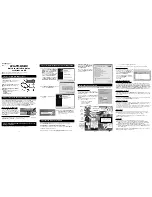
RECEPTION TECHNIQUES
Antenna Cabling:
The lead-in cable from the antenna is often the weakest link in the FM system.
Some time spent on selection and matching will yield dramatic results when it
comes to noise reduction in weak signals.
A good grade of 75-ohm coaxial cable will provide very sufficient signal passage,
along with effective shielding against interference. Without effective shielding your
coaxial cable can in fact become an antenna in itself. There are different grades
of 75-ohm cable, RG59/U (Suitable for 50 feet and less) and RG 6. RG 6 is the
better of the two and should be used in runs of 50 feet or more. The RG 6 has
quad shielding and 50 % less losses than RG 59/U.
A good type of RG 6 is Beldon 1189 A. Combine this cable with LRC connectors
and you will have an installation that will optimize the performance of your tuner.
The key to maximizing the efficiency of the system is insuring that all connections
are clean and tight, silicon grease on outdoor connections will insure good
performance over a long period of time. If you splice either cable, make sure that
exactly the same type of cable is used.
Types of Antennas:
Multi-element Yagi
- This is a unidirectional antenna capable of pulling in very
distant stations due to its high gain. The higher the gain the better. These types
of antennas are directional and should be used with a rotor to get the maximum
benefit from the antenna. The directional feature helps eliminate multi-path
problems by allowing only the signal from the direction that the antenna is facing
to be picked up by the antenna and not the signals that come from different
directions.
Magnum Dynalab offers two Yagi antennae, the MD 6 FM or MD 10 FM
Vertical ½ Wave
- This design offers ease of installation and operation. This type
of antenna is omni-directional, which means that it picks up stations coming from
all directions. No rotor is required to pull in stations from behind or the side. This
design also gathers more of the FM signal from the air, offering superior fidelity
over that of a standard bi-directional antenna. It also gives 2.5 dB gain to the
signal strength over that of a standard dipole.
If multi-path is a reception problem, try laying the antenna down in the horizontal
plane rather than the vertical plane. This type of antenna can be used indoors or
- 12 -
Summary of Contents for MD 109
Page 15: ...IMAGE OF RC2 REMOTE 15 ...


































